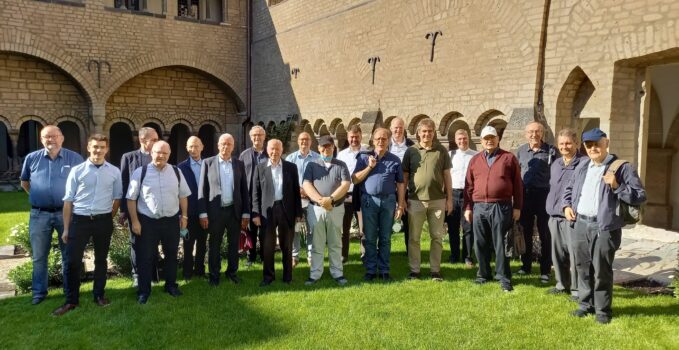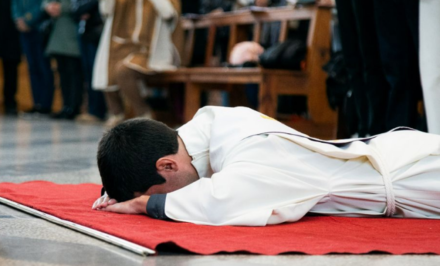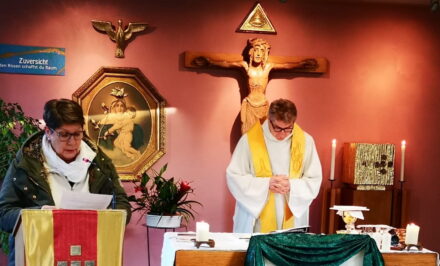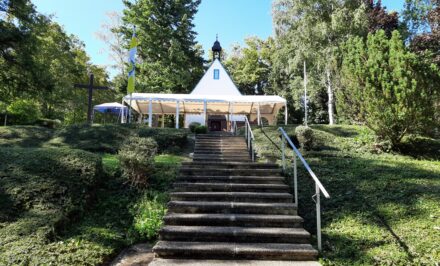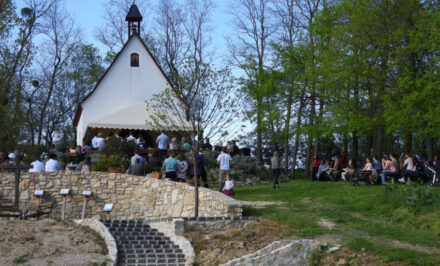GERMANY, Dietmar Herrmann •
Tomorrow’s pastoral care is full of points of tension: Proximity and distance, power as a person and power in function, vulnerability, spiritual power and managerial power, secularity and religiosity, faith in life itself and faith in a personal God of life. During the first week of September 2021, 25 priests from the four Schoenstatt priestly communities met at the Marienau Priests’ and Guests’ House in Schoenstatt to explore. —
As an introduction, Schoenstatt Father Hans-Martin Samietz gave insight into the role of the educator/pastor as seen by Father Joseph Kentenich. This was deepened by Schoenstatt Father Felix Geyer, who gave a social-ethical classification: “Where are the limits of power? Or where does action become encroaching and pastoral care stop and spiritual/spiritual abuse begins”. The joint discussion made clear how much attentiveness is needed today, both with regard to vulnerability, i.e. the danger of hurting others through pastoral statements, and in respect for one’s own vulnerability, i.e. being vulnerable in one’s own actions as a pastor.
Dealing with power, faith, bonds
Dominican Father Prof. Dr. Thomas Eggensperger deepened this with thoughts of Thomas Aquinas with which he emphasized the “prudence in dealing with power”. First of all, a clear definition of power is needed. He presented Meyer-Blank’s concept of power for this purpose: “Power is… the granted authority to do something… that he or she would not do without this power.” Criteria of how interpretive power arises, and especially which aspects of prudence are advisable in its application, led to an intensive exchange, especially in the various fields of work of those present.
Theological impulses for pastoral care of tomorrow were brought in by Dominican Father Prof. Dr. Ulrich Engel. He presented the change for the church and the change for pastoral care. There is a common point of reference between secular and religious people. This is a basic trust in life, the so-called “everyman faith” (Ch. Theobald SJ). It is necessary to endure that this faith in life does not become faith in God in secular people. Nevertheless, there are always interruptions, which can be interpreted that the Holy Spirit appears in it. In an exciting discussion, places and action spaces were discovered in which this secular pastoral care has long been lived.
Prof. Dr. Kathrin Bieler presented the importance of the attachment organism as a spiritual resource. Various studies prove the increasing individualization. Nevertheless, a new “we” appears, which most conference participants also observe in their work, but which is difficult to describe because it is very different.
With each other
In addition to these intensive discussions of content, the study week was characterized by the togetherness of the four priestly communities and the experience of how unifying and beneficial the exchange between the associations, the Federation and the League is. Common prayer was a pillar that strengthened the togetherness.
The study week also included an excursion to Bonn and a conversation with the dean of the city, Wolfgang Picken, who presented the pastoral concept for the newly designed cathedral in a very lively and convincing manner, and whose explanations stimulated further reflection. The conference concluded with a common renewal of the spirit and a study of Father Kentenich’s texts.
At the end of the meeting, there was a unanimous opinion: it needs to be continued: the meeting of September 4-9, 2022 is already in the making.
Original: German 12.09.2021 Translation: Lindsay Burger, Ohio, USA


